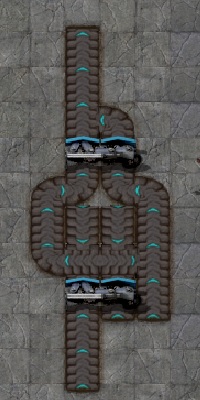
Also doubles as a count perfect 2 to 1.



I just saw in your post with the screenshot that the underground belt that receives the plastic is the wrong direction. When you fix it the balancer should be perfect.Samky wrote: However the one I posted a picture of a few posts ago was under the lane balancer section. It certainly pulls evenly from the lanes it pulls from, true, but it also ignores two of the lanes. For example output lane 1 pulls only from input lanes 1 and 3. The wiki page says they "pull evenly from the input lanes when the output is backed up. They are input and output balanced."

Yes the 2-belt version is not perfect under all circumstances, but the 1-belt version truly is. The 2-belt version is cheaper, but you can also use two of the 1-belt ones and use another splitter to mix the outputs. Then it works perfect. It just needs more splitters and they are expensive. Usually both will be fine.Samky wrote:Now I'm a little excited. My design is much better. This one only distributes the even inputs to the even outputs and the odd inputs to the odd outputs. Look how easy it was to clog it.
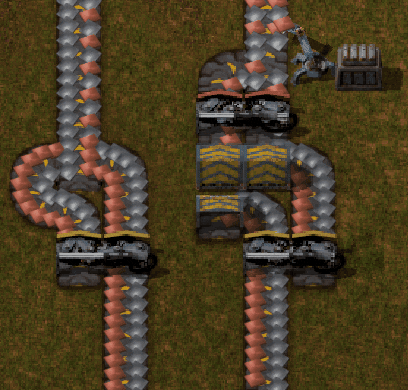
I hope you realize the reason it's clogging up is cause you have an underground belt running backwardsSamky wrote:Now I'm a little excited. My design is much better. This one only distributes the even inputs to the even outputs and the odd inputs to the odd outputs. Look how easy it was to clog it.hansinator wrote:
These are the best lane re-balancers I know of. They always take balanced from the input lanes. Found here: https://imgur.com/a/sgAsj#lsEagUO
In my design, each individual output lane takes equally from each individual input lane. Not only is it balanced, but it's impossible to clog.
(test with 200 items in each lane, with blocked output lanes 1 and 3. Result shown bottom center)
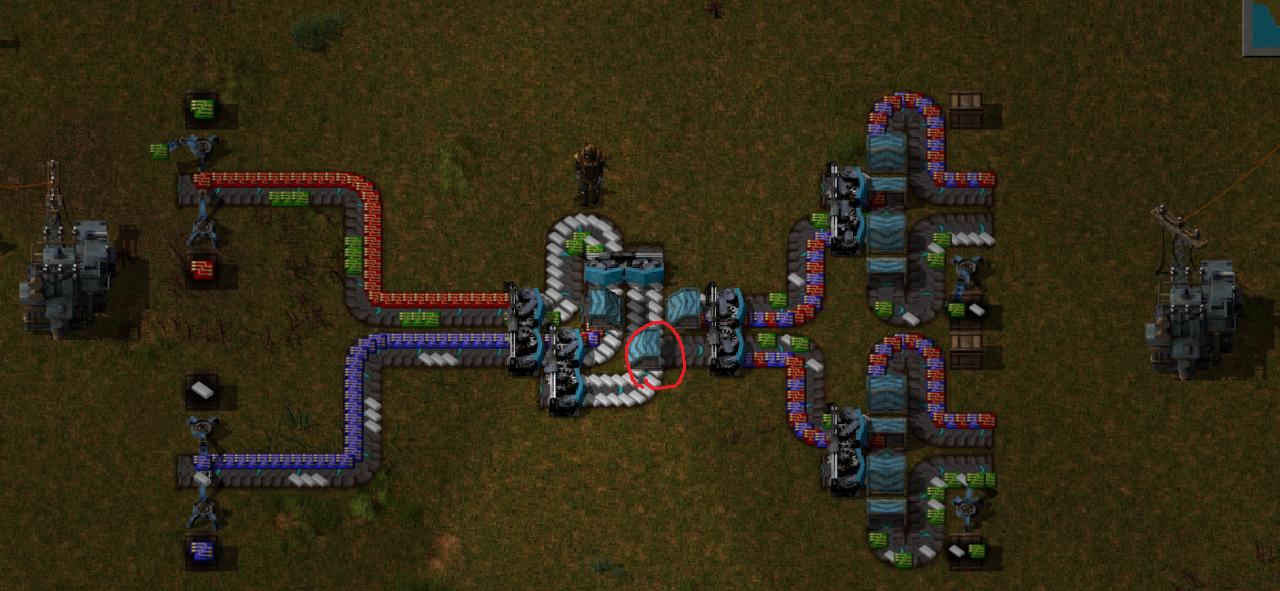
Thank you, it has been some hard workhansinator wrote:
edit:
@Bilka
The wiki page you made is really nice. That is the definitive answer to all these belt threads
I assume the throughput losses you describe there have to do with this phenomenon viewtopic.php?f=5&t=25008 ?
I've built dozens of test setups to investigate that and I've got some hand-drawn diagrams that outline the theory of what happens and why it can't be mitigated easily. I'd like to contribute a small section about the theory (nothing mathematical, just a simple explanation of item flow) behind it to the wiki page, if possible?
edit2:
I've made a small gif to illustrate the difference between input/output lane-balancers and output-only lane-balancers. Maybe it could be included into the wiki page to quickly give a better understanding?
Stick it halfway down the line of buildings demanding the items.Ephron wrote:No, That won't work, because if demand comes only from e.g. the right lane, a full belt will cause this:
and nothing will be gained.
That inserter is pulling off both sides of the belt.hansinator wrote: edit2:
I've made a small gif to illustrate the difference between input/output lane-balancers and output-only lane-balancers. Maybe it could be included into the wiki page to quickly give a better understanding?
That's just because the inserter is pulling faster than a single lane of yellow belt can provide, although the majority of the pulled items are still from the closer side. But yes, the design works just fine, no matter which side the items are pulled from. In a properly designed lane-balancer, ANY input lane can end up on any output lane.zytukin wrote:That inserter is pulling off both sides of the belt.
Would that design work with a normal inserter that only pulls off one side?
This style of balancer does not work as desired.hansinator wrote:
The splitters do not ensure that, true. That's why we have lane balancers. The lane balancer ensures that the first splitter pulls evenly from the input belts.Tubig wrote: Both of the setups show in this gif will have the same effect if the input belt is loaded with a single item type (ie all iron plate instead of iron on right and copper on the left): both setups will drain resources from the opposite input lane that the output lane drains. If an inserter is drawing resources from the left output lane, the right input lane will be drained before the left input lane moves and vis versa.
Splitters only ensure that for each item type they alternate which belt they use for output. Splitter do NOT balance between lanes.
Splitters do NOT ensure that they pull evenly from input belts. Only when the output belts have a fast flow of resources does a splitter draw evenly from both input belts. If the output belts are pulling resources slowly, a splitter will pull from one input belt and not the other.
Then you are doing it wrong. Have a look at this page: https://wiki.factorio.com/Balancers . All the belt balancers are input balanced, which means that they drain their input belts evenly. (No, not the input lanes, the input belts. If you want to drain multiple belt lanes evenly, have a look at the input and output balanced lane balancers.) Don't believe me? Test the balancers. They work.Tubig wrote: Splitters and belts are terrible at load balancing: I have not found any way to ensure that two (or more) inputs are drained evenly without using circuit networks. However, they work great for load prioritisation: it is relatively easy to ensure that one input is drained before another.
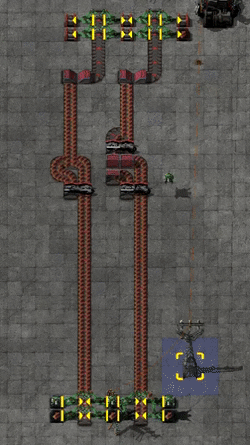


The above GIF definitively proves you wrong. Maybe you should invest more time validating your claims by experiment to avoid posting wrong ones.Tubig wrote:The only reason that it appears to work in this gif is because the item types are different on each side of the input belt. If both sides of the input belt have the same item type, then you cannot be assured that it will pull evenly from both lanes. The only reason that the setup on the right appears to pull from both lanes evenly is because the splitters are shuffling the two input items and the inserter is then picking up alternating iron/copper plates from the near side of the belt, causing the alternation between iron and copper plates to be fed into the splitters.




I copied the picture, but it looks like you're right, that it's backwards.
I hope you realize the reason it's clogging up is cause you have an underground belt running backwards
Thanks for this. I'll use it.hansinator wrote:Here's an updated GIF that compares all sorts of relevant setups.

This one is not reliable, it quickly starts to fail. Watch this example where it does no balancing at all:Samky wrote: How the piece below functions:
INPUT either lane -> OUTPUT divides equally between both lanes
This balancer has clearly (!) double the throughput than the one you posted. See for yourself:Samky wrote:By the way the piece pictured below I saw online a few times. As far as I can tell it's functionally identical to the first piece pictured (outputs odd to odd and even to even) except it uses more items. Intuitively, its advantage would be it doesn't bottleneck as you might think my first picture does by going through 1 splitter. But I tested this and they have the same throughput (which I didn't expect, but I guess that's how splitters work).
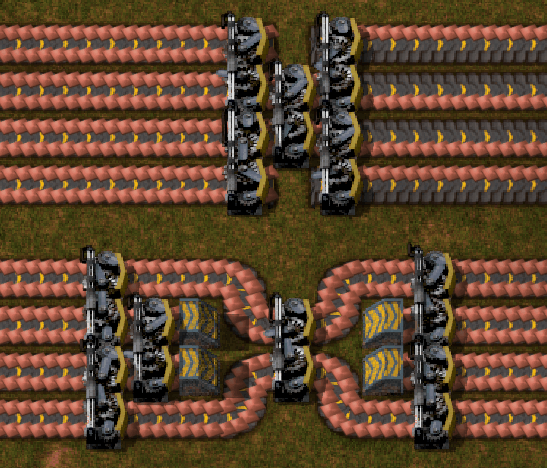
You are right, it is not good at balancing the output lanes, but it balances the output belts properly and it takes balanced from the input lanes.Samky wrote: I copied the picture, but it looks like you're right, that it's backwards.
I re-made it with it turned around and had the same problem. I even added another underground tunnel to try to make it work and it didn't. I mean, it works, but it doesn't balance each input to each output.
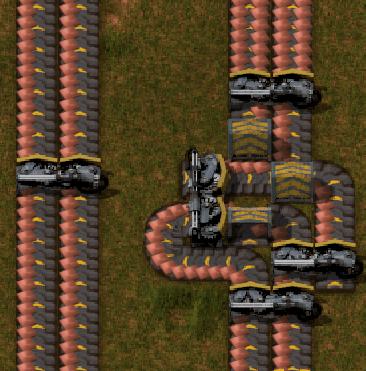
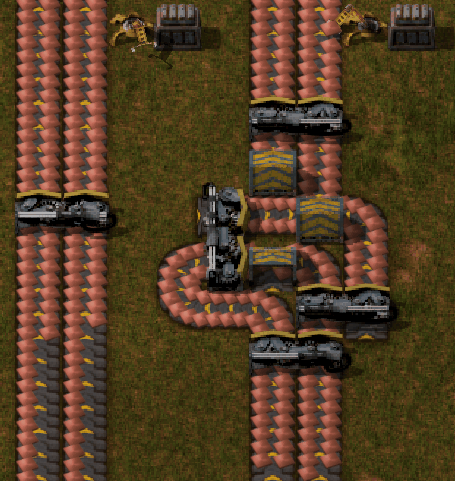
True, belt balancers are rather over-used, and in places they really aren't needed, but they DO have their place. Trains are a big area where they shine (although circuit methods compete heavily here), since they let you load and unload a train evenly across multiple cars, which maintains full throughput to the end.Nich wrote:What value do lane balancers add? If anything they just increase the amount of product wasted on a belt. If the product backs up into the forging area it is going to stop 4 forges on the left side or 4 forges at the end (if it is balanced). Either way things will reach an equilibrium. Also what is the point of belt balancers if you are using product 1 blue belt can only support 2 reds, 1 red can only support 2 yellows and 1 yellow can only support 2 half lanes. I am surprised I have not seen more factories with a shrinking main bus. NamelessPC has a beautiful example viewtopic.php?f=204&t=40605

There are quite a few examples when it comes to furnaces. If you have an odd number of furnaces or an odd number of furnaces with the same speed outputting to one belt then you inevitably will get imbalances and need to re-balance. It mostly matters when beacons come into play. See this example from vanattefeldt: viewtopic.php?f=202&t=33375Nich wrote:What value do lane balancers add? If anything they just increase the amount of product wasted on a belt. If the product backs up into the forging area it is going to stop 4 forges on the left side or 4 forges at the end (if it is balanced). Either way things will reach an equilibrium. Also what is the point of belt balancers if you are using product 1 blue belt can only support 2 reds, 1 red can only support 2 yellows and 1 yellow can only support 2 half lanes. I am surprised I have not seen more factories with a shrinking main bus. NamelessPC has a beautiful example viewtopic.php?f=204&t=40605